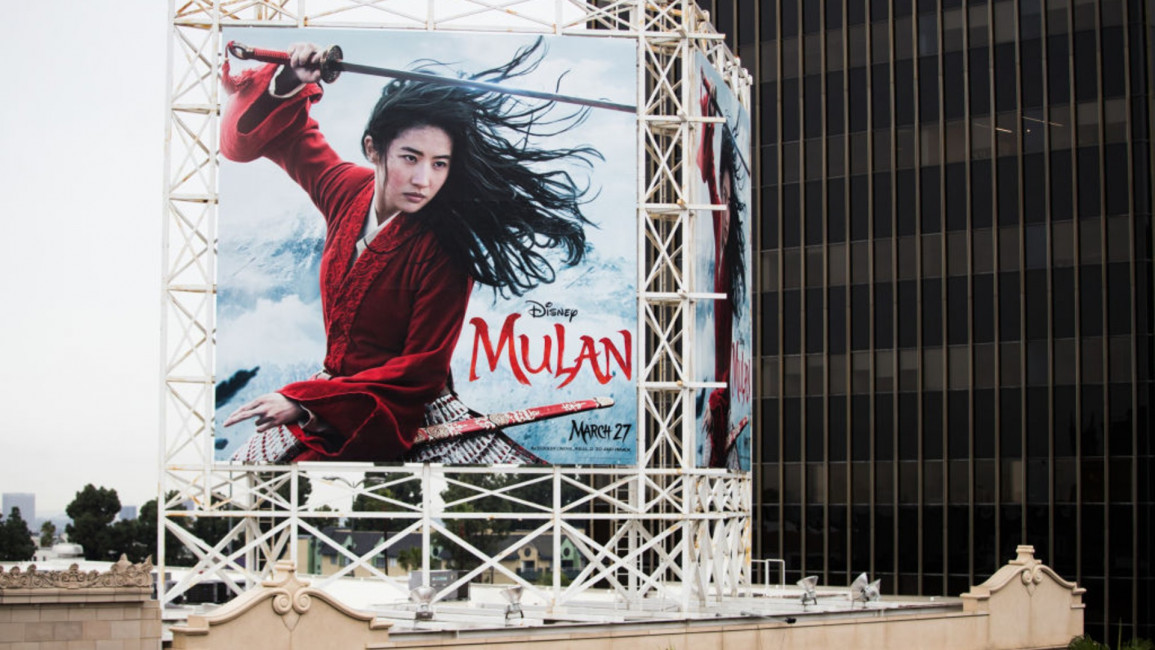
Disney's new Mulan is an insult to China's Uighurs and Muslims everywhere
Whether pointing out the film's cheap orientalism, or lead actress Liu Yifei's support of the Hong Kong police, there are many reasons why this new adaptation is nothing to get excited about. And as if that wasn't enough, the treatment of Muslims within and behind the film is no better.
There are numerous adaptations of the ballad of Hua Mulan but let's just take the first Disney adaptation to illustrate my point. The original cartoon made in 1998 had Mulan facing off against the Hun army. The enemy's portrayal already had problematic elements; the darker skin, for example, as an indicator of villainy. However, Disney's 2020 adaptation of Mulan goes one step further. The invading army now looks like the picture below.
There are several obvious coded references here. The face and head coverings and the clothes look decidedly Middle Eastern. And to a modern western audience, Middle Eastern means "Muslim".
Read more: Mulan movie boycott calls grow over scenes filmed in Xinjiang
Western popular culture has a long and ugly history of using Muslims or Arabs as the villain for their heroes to battle against. Arabs have been portrayed as bandits, lecherous men who prey on white women, and, more recently, terrorists. Arab women are often fetishised as belly dancers or mute submissive doormats in contrast to their more spirited western counterparts.
Disney is certainly no exception. Even when using Middle Eastern culture (in the loosest of terms) as a backdrop for the 1992 cartoon, Aladdin, the very first song had the line describing the setting as a place "where they cut off your ear if they don't like your face but hey! It's home!"
It is highly unlikely that decades of this pervasive use of stereotypes will not have shifted people's perceptions of Arabs, and what they think they know about them.
 |
The historical basis for using Arabs as villains in Mulan is sketchy at best |  |
Millions of children will have been introduced to the Middle East through that very film and given this harmful stereotype as the foundation of their knowledge of Arabs.
Disney's new Mulan uses Arabs for the invading Rouran army. The historical basis for this is extremely thin. The Ballad of Mulan in one of its earliest forms is set in the Northern Wei dynasty, and features military campaigns against the nomadic Rouran Khaganate.
We are not certain of what exactly became of the remnants of the Rouran tribes, historians have contested this, but some have claimed they fled to the Greater Khingan Mountain range and became what we now call Tatars. Tatar is an umbrella term for different Turkic ethnic groups and for many Russian and Europeans came to be associated with Muslims.
 |
|
| The villains in Disney's new Mulan remake have taken on a surprisingly Middle Eastern appearance [YouTube] |
Even if we were to take this particular theory as gospel, this doesn't mean the Rouran army would wear clothes which a modern western audience now associates with Arabs and the Middle East. So the historical basis for using Arabs as villains in Mulan is sketchy at best.
So why exactly did Disney do this? Was it just the ongoing lazy stereotype of using Arabs as villains in popular US culture? Perhaps, but the timing of this film, with its portrayal of a vaguely Muslim invading army, is appalling.
The world is witnessing one of the worst human rights atrocities in recent times. The cultural and physical genocide being carried out by the Chinese Communist Party against Uighur Muslims is now being reported with increasing and sickening clarity, from forced sterilisation to torture.
And at this time Disney has brought out a film does nothing but help that same government with their aim to demonise and eradicate an entire people.
 |
The timing of this film, with its portrayal of a vaguely Muslim invading army, is appalling |  |
This portrayal becomes even more sinister when we look at where Mulan was filmed. In the credits of the film Disney thanks the four Chinese Communist Party propaganda departments in the region of Xinjiang, the region where at this very moment, Uighur Muslims are being ruthlessly persecuted.
As the Washington Post points out, China is an enormous country with many regions and beautiful landscapes. Mulan could have been filmed in any one of these, but Disney chose to film in Xinjiang. They chose to thank those propaganda departments. Such a choice was unnecessary - Chinese filmmakers have often had to work round the Chinese censorship board, but Disney did not have the same constraints.
It is impossible to look at the landscapes of Mulan, after seeing those credits, and not feel the bitterness of what we know is happening there.
The first step of warfare is to demonise a people. No longer seeing them as human beings makes it easier not to care when stories emerge of them drowning at sea in an attempt for a better life, being blown up by bombs dropped by drones, or being subjected to terrible things in concentration camps.
Hollywood has often served as a vehicle for this, but this adaptation of Mulan may be one of the ugliest examples of its kind we've seen yet. To film the pretty landscapes and in an effort to appeal to the Chinese market and make record sales, Disney has stepped on the grounds of genocide and done the Chinese Communist Party's dirty work for them.
Aniqah is a freelance journalist based in Manchester. Her work has appeared in The Independent, gal-dem and Exeunt Magazine. She also writes fiction and poetry and has been published in several anthologies.
Follow her on Twitter: @aniqahc
Have questions or comments? Email us at: editorial-english@alaraby.co.uk
Opinions expressed in this article remain those of the author and do not necessarily represent those of The New Arab, its editorial board or staff.




